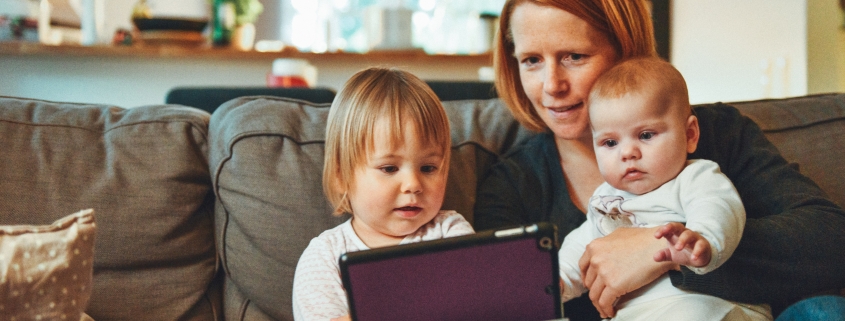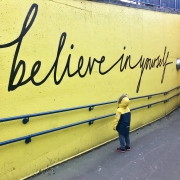Parenting in a Pandemic: 3 Ways Not to Lose Your Mind
Written by Chris Davis, MSSW, LMFT
Parenting is difficult. End of story. I have done office-based and in-home therapy with parents and kids for over 10 years. I believe I have just about seen it all. But how about parenting in a pandemic when it seems like the whole world is falling apart and we’re pretty much stuck inside with our kids? Sounds like a parent’s nightmare. And in many ways, it is.
However, it is possible to shift our thinking, feelings, decision and actions to break the trance of “I’m stuck and this sucks.” In a previous article, I discussed important steps to take before reaching a point where we might possibly abuse the ones we love. Many of the same principles apply here. However, I would like to focus on three other important principles we can follow that will alter our experience enough to make it through these difficult times.
1. Adjust Expectations
There is no template for how to live, much less parent, during a pandemic and extended quarantine. We are all on shaky ground struggling to find our footing. One of the biggest mistakes I have seen when working with parents during the quarantine is the expectation that they can continue parenting as they always do. Their kids will continue to act in the same ways and need to be parented the same ways. This is not the case. NOTHING is normal or the same.
While our children may seem oblivious, or as if they don’t care about what’s happening, they are aware and do care. They are experiencing a significant amount of stress and trauma like the rest of us. Children are very sensitive and pick up on all the stimulation around them. They are like little antennas for stress. Adjusting our expectations and establishing a “new normal” can make all the difference in how successful our parenting is during these difficult times.
2. Strike a Balance
Parenting is on a continuum. On one side are very permissive parents. On the other are very authoritarian parents. Most parents fall somewhere in between. During the quarantine, most parents will attempt to continue parenting as they always have, as discussed in the previous point. Some parents will swing the pendulum to the other side, however. This severe change in parenting can leave children quite confused. The goal of parenting, as with most things in life, is to strike a balance as close to the middle of that continuum as possible. Children need enough guidance and structure to keep them from falling too far without a safety net. But they also need enough room to make some mistakes and learn from them.
During the quarantine, parents who find themselves a little too far on either side of the continuum can benefit from shifting more towards the center. If you are a parent who counts every minute of your child’s screen time, it might behoove you to be a little less stringent on that. If you’re a parent who more or less let’s your kids do whatever they want as long as they aren’t getting hurt, it might be best to tighten that up some. Striking a balance in our parenting can make this quarantine a better overall experience for us as parents and for our kids.
3. Prioritize Play
I believe one of the most important things parents can do to make not only their parenting better during the quarantine, but also just their own personal experiences, is to prioritize play. What I have heard from many parents is that they are struggling to keep themselves busy. They often finish their work faster if they are at home. They clean the house. Then deep clean the house. They hang up that picture they’ve been meaning to. They even organize their sock drawer. Ultimately, they are struggling to find something productive to do. Therein lies the problem: the idea that we should all be productive all the time. We have a serious problem in our culture in that we do not know how to play. This is not everyone of course. There are plenty of adults who are gamers, hikers, and cultural creatives. But many adults struggle with being able to adopt an attitude of play. Now we can relax. And we can vacation. But it’s not the same thing.
Playing is the language of children that we forget as we grow up. When we grow up, our culture tells us it is time to work. We are also told it is okay to rest. Playing, however, is a rarity and requires the ability to flip the idea of being productive on its head. Playing is the opposite of being productive. It doesn’t mean that being productive can’t be a byproduct of play. Some of the greatest inventions and accomplishments came through an adult at play when they occurred. The end product wasn’t even the goal. So, during this time where we are all mostly isolated in our homes with our families, try finding some activities where you can purposely not be productive. You just do the thing, whatever the thing is, for the sheer enjoyment of it. A great way to start is to let your kids teach you their language. Ask if you can join them in whatever activity they are doing. Then branch out to find your own activities that you can immerse yourself into. By prioritizing play, we can detach for a while from the madness the world is experiencing. We can drop into a different experience with our children.
Chris Davis is a Licensed Marriage and Family Therapist with over 10 years experience working with individuals, couples, and families. Chris’s passion is helping couples increase their intimacy and connection with one another to have the type of relationships they have hoped for. Chris is also passionate about helping everyone he meets to experience increased awareness and mindfulness to be more present in their lives. He utilizes a variety of techniques and approaches to meet each individual and couple where they are.












